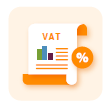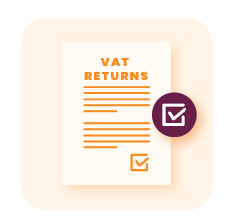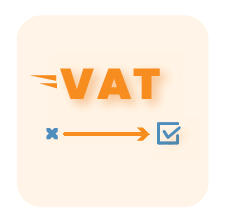VAT in Spain
Since becoming a member of the European Union in 1986, Spain has evolved into a dynamic and swiftly progressing economy, while also establishing itself as a worldwide proponent of freedom and human rights.
In Spain, the State Tax Agency, functioning under the Ministry of Finance and Public Administrations, is tasked with overseeing and administering the Value Added Tax (VAT) system.
Everything you need to know about VAT registration, returns, Tax Representation (if applicable), and your legal duties in Spain is conveniently located right here!
Selling in Spain?
Introduction to VAT in Spain
Each EU member state has its own variation of the VAT numbering format, incorporating different sequences of numbers and letters. For intra-community trade, two letters precede the VAT number when used by a company.
In European trading, the NIF (Número de Identificación Fiscal) is mandatory. Each character in the NIF corresponds to a specific number ranging from 1 to 11, previously known as “Código de Identificación Fiscal.” The first two characters are typically the country code, “ES” in this instance. A format like ESX1234567X is formed by adding a letter, followed by seven digits, and concluding with another letter. This applies to foreign companies as well. However, domestic companies use a number instead of a letter after the country code, resulting in a format like ES12345678X.
Scope of Taxation
VAT in Spain is applied to various kinds of transactions, including:
- The provision of goods and services within Spain by those who are liable for VAT.
- Transactions involving goods and services by entrepreneurs or professionals.
- Acquisitions of goods within the European Community.
- Imports of goods and services.
Taxable persons:
Individuals or organizations conducting business or professional activities are generally recognized as taxable persons and are required to pay VAT on the goods and services they offer. This includes:
- As per Article 5 of the VAT Act, entrepreneurs and professionals encompass both legal entities and individuals involved in business or professional activities, supplying taxable goods or services within Spain.
- All trading companies fall under the category of entrepreneurs and professionals according to the VAT Act.
- Those who make one or more supplies of goods or services using tangible or intangible assets to regularly generate income are also classified as entrepreneurs and professionals.
- Individuals involved in land development or participating in the construction, renovation, or sale of buildings are considered entrepreneurs and professionals, even if these activities are done on an occasional basis.
- Individuals conducting occasional intra-Community supplies of new means of transport exempt from VAT are likewise regarded as entrepreneurs and professionals.
Those who provide goods and services without charge are not deemed entrepreneurs or professionals under the VAT Act.
Spain – VAT information
| Tax Authority | Agencia Tributaria |
| VAT in local languages | Número de Identificación Fiscal (Formerly named Código de Identificación Fiscal) |
| Currency | € Euro |
| VAT number format | For foreign companies, ESX9999999X (country code+letter+7 digits then another letter) For domestic companies, ES99999999X (country code+8 digits then letter) |
| VAT rates
|
Standard 21%; Reduced 10% and 4% |
| Zero-rated (0%) and exempt | |
| Thresholds | |
| Registration | |
| Established | None |
| Non-established | None |
| Intra-Community acquisitions | EUR 10.000 |
| Intra-EU Distance sales and electronically supplied services to consumers (OSS) | EUR 10.000 |
| VAT Group | Applicable on a voluntary basis. |
| Voluntary Registration | Not Applicable. All individuals or entities that carry out taxable transactions are required to register for VAT. |
| Recovery of VAT by non-established businesses | Yes |
| Compliance Returns and Deadlines | |
| VAT Return Q | 20th day of the month following the reporting period |
| VAT Return M | 30th day of the month after the reporting period for taxpayers who are compelled to use a monthly filing period |
| Frequency | Monthly, Quarterly, and Annual returns |
| Intrastat M | 12th of the month following the month |
| Sales List | Monthly- 20th day of the month following the reporting period Quarterly- 20th day of the month following the reporting period Bi-monthly (only once)- 20th day of the month following the reporting period The ESPL returns for December and the fourth quarter must be filed by the 30th of January of the following year.
|
| Annual Return | Between 1 and 30 January. |
| Electronic Invoicing | Mandatory for B2G transactions but optional for other transactions, and invoices with a value of less than 5,000 euro and those from foreign suppliers are exempt. |
Last Updated: 12/12/2023
Disclaimer
The information provided by Global VAT Compliance B.V. on this webpage is intended for general informational purposes only. Global VAT Compliance B.V. is not responsible for the accuracy of the information on these pages, and cannot be held liable for claims or losses deriving from the use of this information. If you wish to receive VAT related information please contact our experts at support@gvc.tax








